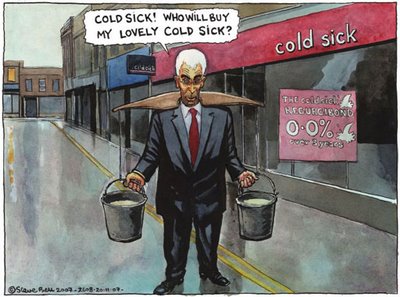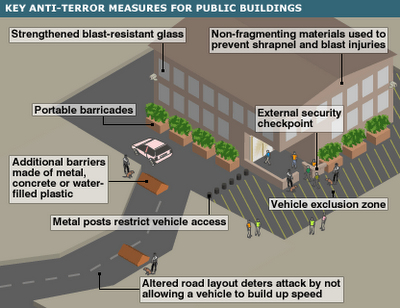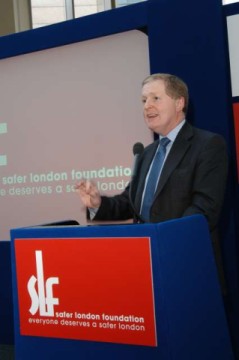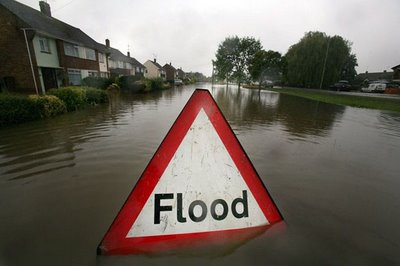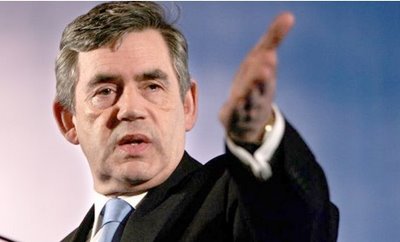 After weeks of dispiriting convergence between the three main political parties, variously swapping and stealing ideas on inheritance tax, the environment and benefit reform, all without any uniting vision to tie them all together, it's to be welcomed that Brown, after promising so much change and so far delivering next to none has set out how he intends to be different to Blair on constitutional issues, civil liberties and further empowering parliament. To go with a cliche, you wait ages for a decent speech on policy and then two come along at once, as while Brown was talking at the University of Westminster on liberty, Jack Straw was in Cambridge delivering the Mackenzie Stuart Lecture on a prospective bill of rights.
After weeks of dispiriting convergence between the three main political parties, variously swapping and stealing ideas on inheritance tax, the environment and benefit reform, all without any uniting vision to tie them all together, it's to be welcomed that Brown, after promising so much change and so far delivering next to none has set out how he intends to be different to Blair on constitutional issues, civil liberties and further empowering parliament. To go with a cliche, you wait ages for a decent speech on policy and then two come along at once, as while Brown was talking at the University of Westminster on liberty, Jack Straw was in Cambridge delivering the Mackenzie Stuart Lecture on a prospective bill of rights.
Martin Kettle on CiF has already suggested that these were speeches aimed directly at Guardian/Independent readers and those who've been disgusted by the contempt that Labour over the last ten years has shown for civil liberties in general, and he's almost certainly correct. Straw opens his speech with
If you read certain newspapers you might be forgiven for thinking that human rights were an alien imposition foisted upon us by 'the other'. It is a misconception that has regrettably taken root.
and goes on from there. Straw sketches out how the European Convention of Human Rights came into existence, and it makes for grim reading for David Cameron and his ignorant, ahistorical call for a "British" bill of rights, making clear how it's both a legacy of the second world war and also of Churchill himself. Churchill is at times lionised without any regard for his own character flaws, his incipient warmongering and bellicose, first reaction attitude, but his horror at what "total war" inflicted upon Europe led to the protections we now so take for granted and which some want to destroy without any regard for why they were first introduced. It is undoubtedly his second greatest gift to this nation, and Cameron's populist, almost xenophobic policy of scrapping the Human Rights Act is an affront to his memory.
The tabloid press, especially the Sun, is unlikely to take kindly to Straw's speech, especially because it so effortlessly destroys so many of their paper-thin arguments. At times he invites valid ridicule - he talks of how the government would be damned if they "wilfully and knowingly" deported someone to gross ill-treatment and death, without any apparent knowledge that this government is continuing to do just that, whether it's sending "terrorist suspects" back to Algeria, or wanting to deport them to Jordan and other states known to practice torture on the basis of pieces of paper ("memorandums of understanding") from the respective government solemnly promising they won't touch a hair on their heads, or sending "failed" asylum seekers back to states as diverse as Sudan, the Congo, Zimbabwe and Iraq - but his overall message, especially his sneering at the "media uproar around human rights being a terrorists charter" is refreshing compared to what we were used to from Blair, Reid and Clarke, all of whom went out of their way to appease the most basest and baseless of tabloid accusations over human rights. He'll probably be ridiculed as being a soft idiot tomorrow, but it's clear that the corner has been turned. The rules of the game haven't changed after all, remember.
It's a shame then that the remainder of Straw's speech only repeats the nostrums which we've become used to: that there are rights, and with rights come responsbilities. This is the compromise which politicians have been forced into by the tabloid onslaught, the false dichotomy that somehow because we all know our rights we somehow at the same time don't realise that responsibilities come with them. Our rights, whether we're British citizens or not, are indivisible, and the promotion of the belief that somehow when we lose our freedom we also lose those rights is an incredibly dangerous one. Despite spending half of the speech outlining why Cameron's British bill of rights and repealing of the Human Rights Act would never bring justice closer to home or help get rid of current "undesirables", Straw himself believes that there may well be a need for a bill of rights and responsbilities, but he doesn't explain why one is necessary when the HRA is already almost fully comprehensive and the closest we've came to such a charter so far. If we wanted to expand it further, we could have signed up to the EU Charter of Fundamental Rights, an excellent document which updates and takes the ECHR further, yet that was one of Brown's red lines, again thanks to tabloid pressure. There is possibly a case for a document, set down in law, which does outline what is expected of us all as citizens, but to connect it directly to a bill of rights is an awful sop to those who would have just one rather than both. Such a document would have to be incredibly carefully drafted so as not to be openly patronising as so much of the discussion on responsibilities has been, all horribly reminiscent of those school behaviour contracts which you were ordered to sign and which were ignored afterwards.
Rather than a bill of rights, what we really need is an actual written constitution, yet that seems to be one of the few things that neither Brown or Straw are proposing, although Brown says this is meant to be a "move" towards just that. Dumping the bill of rights and getting on with that instead would be a better idea.
Brown's speech on liberty then is one of the best he's delivered in a long time, although with his recent pedigree that wasn't that much of a challenge. The first half is an excellent historical narrative, from Magna Carta to the HRA, with quotes from Bolingbroke, Voltaire, de Tocqueville, Orwell, Himmelfarb, Stuart Mill, T. H. Green and Hobson; all of it striking in its difference to the former prime minister, who despite his mendacity was undoubtedly a powerful speaker, but one whose speeches sounded good rather than read good. The inevitable disappointment is that so many of the proposals he's putting forward are either tame or subject to drawn-out consultation. The idea that there needs to be any further consultation on whether to lift the ban on demonstrations within a mile of parliament is a joke: the prohibition makes a mockery of our democratic credentials, and all those men he quoted would have been disgusted by it.
Similarly, like with Straw, Brown has to make concessions to the tabloids, in his case appointing his friend Dacre of the Beast to a committee examining whether to lift the "30-year-rule" on access to government documents. Dacre's loyalty and err, brown-nosing has been rewarded remarkably quickly. The farthest he really goes is in rightly abandoning the Blairite plans to further limit the Freedom of Information Act, which he announces are to be dropped immediately, with a view to actually expanding the act further, with private companies bidding for public contracts also being potentially being brought within its scope, which is incredibly welcome and surprising considering Brown's reliance on the hugely wasteful private finance initiative. Whether words will be converted into actuality will be key. He also opens the possibility of the roughly 250 provisions which give access to private homes, increasingly exploited by entirely unaccountable bailiffs, being brought into a single code.
He is however wholly unconvincing on the need for ID cards, on which the objection is not really to the cards themselves but to the database behind them, while the fact that biometrics are being used by companies already is completely irrelevant; just because they are doesn't mean that the government should be. Out of the window at least has gone the argument for ID cards on the basis of preventing terrorism, but the need for them because of identity fraud is just as flimsy, with Brown's claims of parliament having put the relevant safeguards and accountability needed into the legislation simply untrue. He also says how he "is in no doubt about the desirability of a debate over pre-charge detention", yet there's little point in having a debate when both Brown himself and Jacqui Smith have time and again made clear that they favour an increase from 28 days, and when Smith has hinted that the legislation for an increase could come before parliament before Christmas. They don't seem to realise that an increase from 28 days has become the defining issue, the summation of all that has been wrong about Labour's approach to civil liberties. When we potentially have a longer "pre-charge" period than some dictatorships, something is clearly rotten, and no amount of spurious claims from the police or intelligence chiefs that longer "may" be needed are going to convince us otherwise.
The CiF comment thread on Kettle's piece is a good guide to how much further Brown and Straw could have gone. The "dangerous pictures" bill deserves to be withdrawn immediately; control orders are both illiberal and ineffective; those not convicted of any crime subject to removal to countries which are known to practice torture on the grounds that they are "not conducive to the public good" should be tried rather than simply got rid of; and the tightening of the prevention from harassment act to ensure that those engaged in legitimate protest are not prevented from doing so, all could also have been begun to be dealt with. In places Brown also falls into producing the same sort of chutzpah as that of Straw above, claiming that "our abhorrence of torture is and must be unequivocal", which must be a surprise to those who found themselves kidnapped by the CIA and taken to black sites, all with the connivance of a nod and a wink from the British authorities, who knew full well what was going on. Recent allegations have even suggested that there was a black site on Diego Garcia, the islands we kicked the inhabitants off, giving their home to the US military, from which attacks on Iraq have taken place.
Overall though, this was a good start, and an encouraging break from the past 10 years of hardly hidden contempt for the "civil liberties brigade". These words however must precipitate action, otherwise Brown will fall even further into the currently deserved sobriquet of bottling it.Labels: 56 days, bill of rights, civil liberties, constitutional reform, freedom of information, Gordon Brown, human rights act, Jack Straw
